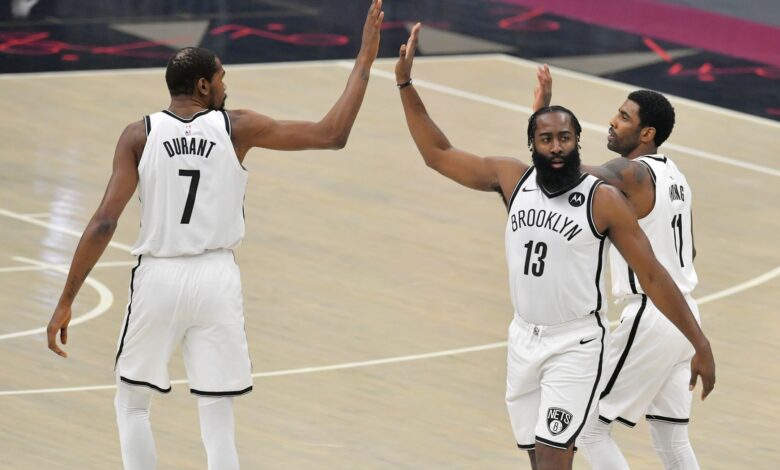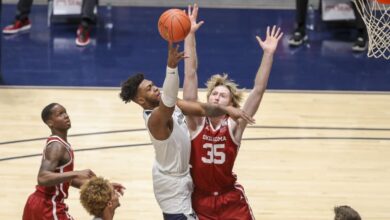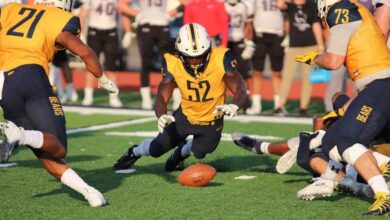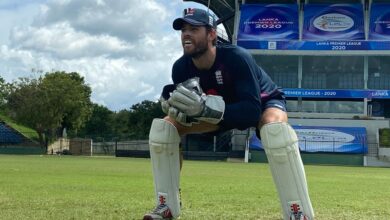Kevin Durant, James Harden, Kyrie Irving and the history of all-time great NBA scoring trios

[ad_1]
All three Brooklyn Nets stars — Kevin Durant, James Harden and Kyrie Irving — are on course to average in excess of 20 points per game. They would be the 23rd trio to accomplish that feat, and the history of their NBA predecessors suggests winning a championship with similar roster construction is a long-shot at best.
Then again, only one other 20-point triumvirate has been so adept at long shots. They, too, featured Durant, and they just so happen to be the only such grouping to have ever won a title. Durant, Stephen Curry and Klay Thompson, who each averaged more than 20 points per game for three straight seasons together, led the Golden State Warriors to back-to-back championships in 2017 and 2018. It took devastating injuries to both Durant and Thompson in the Finals to keep their Warriors from winning a third straight title in 2019.
So, where do Durant’s Nets stand? Can they follow Golden State’s so-far singular blueprint for immortality? Or will they join the list of 21 other 20-point trios that fell short of their championship goal on 25 occasions?
Nine of those 25 teams finished with a winning percentage of .500 or worse and a negative net rating. The Nets are 12-8 overall, 5-2 since acquiring Harden in a blockbuster trade, with a fairly comfortable plus-3.7 net rating (albeit only plus-0.8 in two weeks since the deal). I am comfortable saying Brooklyn will finish in the black on both accounts, safely avoiding abject failure. For the record, those nine aforementioned teams:
1961-62 St. Louis Hawks (29-51)
Net rating: -2.6, seventh in a nine-team league (second on offense, ninth on defense)
-
Bob Pettit: 31.1 points per game (78 games)
-
Cliff Hagan: 22.9 points per game (77 games)
-
Clyde Lovellette: 20.9 points per game (40 games)
1968-69 San Francisco Warriors (41-41)
Net rating: -1.4, ninth of 14 (13th on offense, fifth on defense)
-
Jeff Mullins: 22.8 points per game (78 games)
-
Nate Thurmond: 21.5 points per game (71 games)
-
Rudy LaRusso: 20.7 points per game (75 games)
1969-70 Chicago Bulls (39-43)
Net rating: -1.5, eighth of 14 (11th on offense, ninth on defense)
-
Chet Walker: 21.5 points per game (78 games)
-
Bob Love: 21.0 points per game (82 games)
-
Clem Haskins: 20.3 points per game (82 games)
1969-70 Phoenix Suns (39-43)
Net rating: -1.5, seventh of 14 (third on offense, 13th on defense)
-
Connie Hawkins: 24.6 points per game (81 games)
-
Dick Van Arsdale: 21.3 points per game (77 games)
-
Gail Goodrich: 20.0 points per game (81 games)
1971-72 Detroit Pistons (26-56)
Net rating: -6.0, 14th of 17 (12th on offense, 16th on defense)
-
Bob Lanier: 25.7 points per game (80 games)
-
Dave Bing: 22.6 points per game (45 games)
-
Jimmy Walker: 21.3 points per game (78 games)
1980-1981 Denver Nuggets (37-45)
Net rating: -0.4, 14th of 23 (first on offense, 22nd on defense)
-
David Thompson: 25.5 points per game (77 games)
-
Alex English: 23.8 points per game (81 games)
-
Dan Issel: 21.9 points per game (80 games)
1982-83 Utah Jazz (30-52)
Net rating: -3.9, 18th of 23 (20th on offense, 12th on defense)
-
Adrian Dantley: 30.7 points per game (22 games)
-
Darrell Griffith: 22.2 points per game (77 games)
-
John Drew: 21.2 points per game (44 games)
2013-2014 Sacramento Kings (28-54)
Net rating: -3.1, 22nd of 30 (20th on offense, 23rd on defense)
-
DeMarcus Cousins: 22.7 points per game (71 games)
-
Isaiah Thomas: 20.3 points per game (72 games)
-
Rudy Gay: 20.0 points per game (55 games)
2018-2019 New Orleans Pelicans (33-49)
Net rating: -1.3, 20th of 30 (13th on offense, 23rd on defense)
-
Anthony Davis: 25.9 points per game (56 games)
-
Julius Randle: 21.4 points per game (73 games)
-
Jrue Holiday: 21.2 points per game (67 games)
A 10th team failed to make the playoffs:
2007-2008 Golden State Warriors (48-34)
Net rating: +2.2, 13th of 30 (fourth on offense, 23rd on defense)
-
Baron Davis: 21.8 points per game (82 games)
-
Monta Ellis: 20.2 points per game (81 games)
-
Stephen Jackson: 20.1 points per game (73 games)
Those post-“We Believe” Warriors are comparable to the Nets from the standpoint of where in the league they ranked on offense and defense. Brooklyn is currently ranked fourth in offensive rating (115.0 points per 100 possessions) and 24th in defense rating (111.4 points allowed per 100 possessions). This year’s Eastern Conference is not nearly as competitive as a West that produced eight 50-win teams in 2007-08.
The Nets will avoid missing the playoffs. To do so would be an embarrassment far beyond those Warriors, who only counted Davis as a former All-Star and one-time All-NBA selection. Durant and Harden are both former MVPs and perennial All-NBA picks. Irving’s two All-NBA nods brings the total between them to 18.
A handful of 20-point trios have equally impressive trophy cases, all of which we will get to, but not to have two of those scorers with multiple All-NBA selections under their belt has proven an obstacle to contention.
Scratch two more trios and three more teams from the list:
1971-72 Golden State Warriors (51-31)
Playoffs: Lost Western Conference first-round series, 4-1
Net rating: +0.7, fourth of 17 (13th on offense, fourth on defense)
-
Jeff Mullins: 21.5 points per game (80 games)
-
Cazzie Russell: 21.4 points per game (79 games)
-
Nate Thurmond: 21.4 points per game (78 games)
1986-87 Seattle SuperSonics (39-43)
Playoffs: Lost Western Conference Finals, 4-0
Net rating: +0.5, 10th of 23 (sixth on offense, 16th on defense)
-
Dale Ellis: 24.9 points per game (82 games)
-
Tom Chambers: 23.3 points per game (82 games)
-
Xavier McDaniel: 23.0 points per game (82 games)
1987-88 Seattle SuperSonics (44-38)
Playoffs: Lost Western Conference first-round series, 3-2
Net rating: +2.0, 10th of 23 (seventh on offense, 16th on defense)
-
Dale Ellis: 25.8 points per game (75 games)
-
Xavier McDaniel: 21.4 points per game (77 games)
-
Tom Chambers: 20.4 points per game (82 games)
Seattle reflects just how volatile the results can be for a team relying on a trio of scorers who cannot get stops on the other end. A sub-.500 Sonics group made the Western Conference finals one year, and a barely above .500 Sonics squad lost in the first round the next. Ellis made a single All-NBA team, and McDaniel made none. Each appeared on one All-Star team. Ellis and McDaniel are not Harden and Irving.
The talent disparity is so great that to compare them is a waste of time. A few more teams are teetering off the edge here, too, with second stars who bare no resemblance to Harden, much less Irving as a third star:
1978-79 Phoenix Suns (50-32)
Playoffs: Lost Western Conference finals, 4-3
Net rating: +3.4, third of 22 (seventh on offense, sixth on defense)
-
Paul Westphal: 24.0 points per game (81 games)
-
Walter Davis: 23.6 points per game (79 games)
-
Truck Robinson: 21.1 points per game (26 games)
1988-1989 Phoenix Suns (55-27)
Playoffs: Lost Western Conference finals, 4-0
Net rating: +7.3, second of 25 (second on offense, fifth on defense)
-
Tom Chambers: 25.7 points per game (81 games)
-
Eddie Johnson: 21.5 points per game (70 games)
-
Kevin Johnson: 20.4 points per game (81 games)
Shoutout to Tom Chambers, a two-time All-NBA selection who made this list for two different teams over the course of three consecutive seasons, and reached the Western Conference finals with both of them. It is a testament to how far a 20-point trio of extremely-good-but-not-all-time-great players can carry a team.
It remains to be seen which category last year’s Boston Celtics will fall into:
2019-2020 Boston Celtics (48-24)
Playoffs: Lost Eastern Conference finals, 4-2
Net rating: +6.3, third of 30 (fourth on offense, fourth on defense)
-
Jayson Tatum: 23.4 points per game (66 games)
-
Kemba Walker: 20.4 points per game (56 games)
-
Jaylen Brown: 20.3 points per game (57 games)
They reached the Eastern Conference finals with a pair of one-time All-NBA selections — Kemba Walker and Jayson Tatum — but Tatum is still only 22 years old, and 24-year-old fellow 20-point scorer Jaylen Brown (up to 27.1 points per game so far this season) could also develop into a perennial All-NBA pick.
That would change how we view them from a historical perspective, because the remaining 20-point trios — all of which feature multiple Hall of Famers — formed historically great teams, with just two exceptions:
1981-1982 Denver Nuggets (46-36)
Playoffs: Lost Western Conference first-round series, 2-1
Net rating: +0.5, 13th of 23 (first on offense, 23rd on defense)
-
Alex English: 25.4 points per game (82 games)
-
Dan Issel: 22.9 points per game (81 games)
-
Kiki Vandeweghe: 21.5 points per game (82 games)
1982-1983 Denver Nuggets (45-37)
Playoffs: Lost Western Conference semifinals, 4-1
Net rating: +0.6, 12th of 23 (third on offense, 20th on defense)
-
Alex English: 28.4 points per game (82 games)
-
Kiki Vandeweghe: 26.7 points per game (82 games)
-
Dan Issel: 21.6 points per game (80 games)
1990-91 Golden State Warriors (44-38)
Playoffs: Lost Western Conference semifinals, 4-1
Net rating: +1.6, 11th of 27 (sixth on offense, 23rd on defense)
-
Chris Mullin: 25.7 points per game (82 games)
-
Mitch Richmond: 23.9 points per game (77 games)
-
Tim Hardaway: 22.9 points per game (82 games)
Those teams — neither of which got past the second round — seem like a worst-case scenario for this season’s Nets. The fast-paced offenses of Doug Moe’s early-1980s Nuggets and Don Nelson’s early-’90s Warriors often came at the expense of their defenses. Brooklyn ranks sixth in possessions per 48 minutes this season at a pace that falls between what qualified as up-tempo in the early ’80s and ’90s. That there is a similar disparity in their offensive (ranked fourth of 30) and defensive ratings (24th) should be of concern.
Keep in mind, those Nuggets and Warriors never averaged more than a few three-pointers per game as a team. Durant, Harden and Irving are each averaging more than twice as many attempts for the Nets and making them at well above-average rates. Their added efficiency accounts for a net rating (plus-3.7) that sits several points higher than those sub-optimal-achieving Denver and Golden State teams of another era.
Is it enough to launch them into the stratosphere of the remaining teams on our list (six trios, 10 seasons)? Each triumvirate featured three Hall of Famers, two MVPs or both. Durant, Harden and Irving qualify. In some form, all of these teams won at least one championship, albeit not always in a season they all averaged 20 points per game. At worst, they ranked middle of the pack on defense, a dividing line for the Nets. Even a mild defensive improvement from Brooklyn should put them in the company of these teams:
1959-60 St. Louis Hawks (46-29)
Playoffs: Lost NBA Finals, 4-3
Net rating: +2.2, second of eight (first on offense, fifth on defense)
-
Bob Pettit: 26.1 points per game (72 games)
-
Cliff Hagan: 24.8 points per game (75 games)
-
Clyde Lovellette: 20.8 points per game (68 games)
1960-61 St. Louis Hawks (51-28)
Playoffs: Lost NBA Finals, 4-1
Net rating: +2.7, second of eight (second on offense, second on defense)
-
Bob Pettit: 27.9 points per game (76 games)
-
Cliff Hagan: 22.1 points per game (77 games)
-
Clyde Lovellette: 22.0 points per game (67 games)
Pettit and Hagan reached four Finals in a five-year stretch, winning a title together in 1958. Lovellette joined midway through for the last two Finals appearances, and they came within a Game 7 against Bill Russell’s Celtics of another ring. Should the Nets be concerned a third scorer never yielded a title for the Hawks? Let’s not spend too much time comparing three modern shot creators to an inefficient 1960s frontcourt trio.
1966-67 Boston Celtics (60-21)
Playoffs: Lost Eastern Conference finals, 4-1
Net rating: +6.6, second of 10 (fourth on offense, first on defense)
-
Sam Jones: 22.1 points per game (72 games)
-
John Havlicek: 21.4 points per game (81 games)
-
Bailey Howell: 20.0 points per game (81 games)
This trio won the last two of Russell’s 11 championships together in 1968 and 1969, when Howell’s scoring average dipped just below 20 points per game (19.8 and 19.7, respectively). Again, not much to read into.
1968-69 Los Angeles Lakers (55-27)
Playoffs: Lost NBA Finals, 4-3
Net rating: +3.6, fourth of 14 (second on offense, eighth on defense)
-
Jerry West: 25.9 points per game (61 games)
-
Elgin Baylor: 24.8 points per game (76 games)
-
Wilt Chamberlain: 20.5 points per game (81 games)
1969-70 Los Angeles Lakers (46-36)
Playoffs: Lost NBA Finals, 4-3
Net rating: +1.7, fifth of 14 (eighth on offense, fourth on defense)
-
Jerry West: 31.2 points per game (74 games)
-
Wilt Chamberlain: 27.3 points per game (12 games)
-
Elgin Baylor: 24.0 points per game (54 games)
-
Happy Hairston: 20.6 points per game (55 games)
Baylor was on his last legs still averaging in the mid-20s for these Lakers, and he helped Chamberlain and West take Russell’s Celtics to back-to-back Game 7s in 1969 and 1970. They got an influx of scoring from guys like Hairston and Gail Goodrich upon Baylor’s exit, but it was not until Chamberlain took a backseat on offense, averaging fewer than 20 points for the first time, that he and West won a title together in 1972.
1980-81 Los Angeles Lakers (54-28)
Playoffs: Lost Western Conference first-round series, 2-1
Net rating: +3.7, fifth of 23 (seventh on offense, sixth on defense)
-
Kareem Abdul-Jabaar: 26.2 points per game (80 games)
-
Jamaal Wilkes: 22.6 points per game (81 games)
-
Magic Johnson: 21.6 points per game (37 games)
Wilkes joined Johnson and Abdul-Jabaar for two of the five titles those legends won together, averaging 20-plus points in the 1980 and 1982 championship campaigns. It was Magic whose scoring average dipped below 20 on those runs, reinforcing the idea that some sacrifice is necessary to make the right wheels turn.
1983-84 Philadelphia 76ers (52-30)
Playoffs: Lost Western Conference first-round series, 3-2
Net rating: +2.2, seventh of 23 (seventh on offense, fourth on defense)
-
Moses Malone: 22.7 points per game (71 games)
-
Julius Erving: 22.4 points per game (77 games)
-
Andrew Toney: 20.4 points per game (78 games)
Malone, a three-time MVP, joined a Sixers team that had reached the Finals on Erving’s back in two of their previous three seasons. This trio won the title together in 1983. Toney’s scoring average jumped above 20 for the only time in his career in 1984, but he scored 19.7 points a night during the championship campaign.
2016-2017 Golden State Warriors (67-15; NBA champions)
Playoffs: NBA champions
Net rating: +11.6, first of 30 (first on offense, second on defense)
-
Stephen Curry: 25.3 points per game (79 games)
-
Kevin Durant: 25.1 points per game (62 games)
-
Klay Thompson: 22.3 points per game (78 games)
2017-2018 Golden State Warriors (58-24)
Playoffs: NBA champions
Net rating: +6.0, third in a 30-team league (third on offense, 11th on defense)
-
Stephen Curry: 26.4 points per game (51 games)
-
Kevin Durant: 26.4 points per game (68 games)
-
Klay Thompson: 20.0 points per game (73 games)
2018-2019 Golden State Warriors (57-25)
Playoffs: Lost NBA Finals, 4-2
Net rating: +6.4, second in a 30-team league (first on offense, 13th on defense)
-
Stephen Curry: 27.3 points per game (69 games)
-
Kevin Durant: 26.0 points per game (78 games)
-
Klay Thompson: 21.5 points per game (78 games)
You know this group well. Durant elevated the Warriors from a team that won a title and 73 regular-season games in their two previous seasons to one that was unstoppable until tendon ruptures cut short the 2019 Finals for Durant and Thompson. It helped that Golden State also featured Draymond Green, a Defensive Player of the Year who made the quartet a monster on defense at their best. That is what Brooklyn lacks.
2020-21 Brooklyn Nets (12-8)
Net rating: +3.7, sixth of 30 (fourth on offense, 24th on defense)
-
Kevin Durant: 30.5 points per game (15 games)
-
Kyrie Irving: 27.9 points per game (12 games)
-
James Harden: 24.1 points per game (7 games)
Still, history suggests these Nets should be in the mix for a title, which may not be groundbreaking news, but the league’s past also tells us that the defense has a long way to go and one of the trio may also have to say goodbye to their 20-point scoring average before Brooklyn can break through as a serious threat.
– – – – – – –
Ben Rohrbach is a staff writer for Yahoo Sports. Have a tip? Email him at [email protected] or follow him on Twitter! Follow @brohrbach
More from Yahoo Sports:
[ad_2]
Source link






